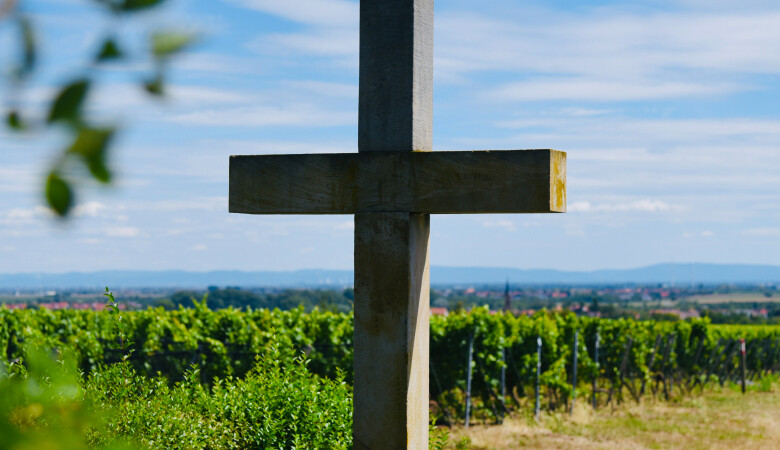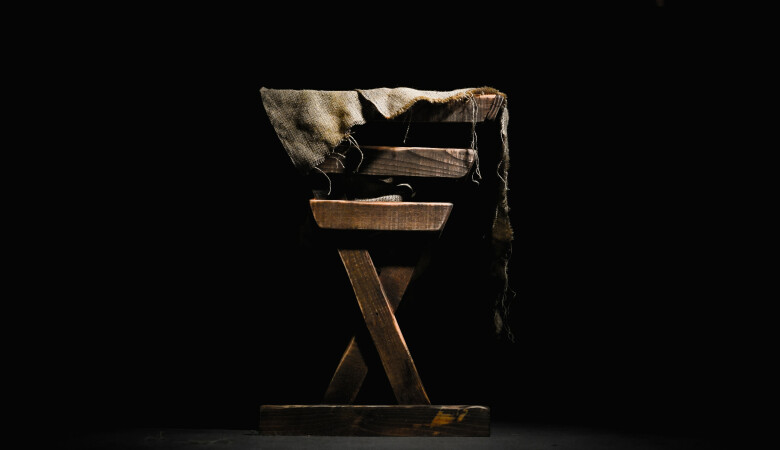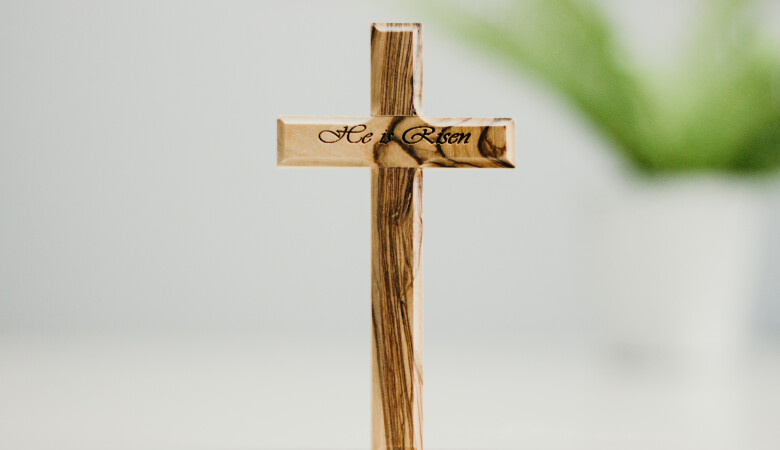Christmas Meditations - Hebrews 1 and 2
December 23, 2001 | Andy Davis
Hebrews 1:1-2:18
Incarnation
Looking at Jesus as the Angels Did
I’d like to ask that you take your Bibles and open to the passage that Herb just read. We are going to be looking at Hebrews 1 and 2, and we are going to be trying to understand again and anew the person of Jesus Christ. I’d like to begin twelve centuries ago, Christmas Day, 800. For that day, Charlemagne visited Rome and went to pray at the tomb of the Apostle Peter. Charlemagne was the King of the Franks, and up to that point, from the fall of the Roman Empire around the year 400 or 430 or so, until that time, chaos had reigned. The barbarian tribes had swept across Europe. Even more, there was a great threat that Islam would become the religion of Europe as Muslims swept up through Spain and were finally stopped by Charles Martel, Charlemagne’s father. So he had been turned back but Europe and the continent was in chaos until Charlemagne took control, and he began to organize not only his own people, but all of the continent of Europe.
And he went there on Christmas Day to worship and to pray and to meet with the pope, the bishop of Rome. And then Charlemagne knelt in that immense basilica of St. Peter, he was surrounded by lofty colors of multi-colored marble and the light strained in through the magnificent stained-glass windows, and he was praying to God. And at that moment, the pope tiptoed behind him, everyone around knew what was happening, but he had not been warned and he placed a crown, the pope placed a crown on Charlemagne’s head. And this is what he said, the pope declared: “To Charles August, now crowned by God, great and peaceful emperor of the Romans, long life and victory.” And thus, at that moment, he crowned the first Holy Roman Emperor. Now, the crown that was placed on his head that day was made of gold and had sparkling precious stones, ornate cameos, and delicate filigree work of gold. It was the best that the crown jeweler could make, the best work available. Two centuries later, they decided to improve on it, and they made an eight-sided crown, which was reminiscent, as far as they were concerned, of the new Jerusalem coming down out of heaven from God.
Now, you will remember from Revelation, the description of the new Jerusalem, and this is what it says, it says, “The wall was made of jasper, and the city of pure gold, as pure as glass. The foundations of the city walls were decorated with every kind of precious stone. The first foundation was jasper, the second sapphire, the third chalcedony, the fourth emerald, the fifth sardonyx, the sixth carnelian, the seventh chrysolite, the eighth beryl, the ninth topaz, the tenth chrysoprase, the eleventh jacinth, and the twelfth amethyst” (Rev 21:18-20). These are beautiful, sparkling jewels and they represent colors from all the hues in the rainbow. And so, they also were represented in the crown that had been made two centuries later for the Holy Roman Emperor. What’s interesting though about each of those stones is that each one was bought at the price of blood. Each one cost lives. They were stolen or they were fought over or warred over, had been captured, brought from mines one or another, to be placed in the crown of the Holy Roman Emperor. And after they were set into that crown, the fighting continued for centuries over who would be the Holy Roman Emperor, who would wear that crown.
And it got me to thinking about that Christmas Day, the way it all began in 800, the crowning of the first Holy Roman Emperor and the earthly crowns that are bestowed on kings like Charlemagne, and I thought to myself: It might be better for us to make a different kind of crown today, a crown for Jesus Christ, not made of earthly materials, not mined up out of mines but instead, just like the new Jerusalem coming down out of heaven from God, beautiful for the king. And the only place we can find for materials like that is the word of God, is it not? And so, we have to go to the word of God and find what kind of jewels should be fit in Jesus’s crown.
I’d like us to do the work of a crown jeweler this morning. I’d like us to focus in on the person of Jesus Christ, on who he is and what he came to do. I would like to make a crown, but not as idolaters would, imagining, thinking about what we would ascribe to Jesus, but rather reading in Hebrews 1 and 2, what is ascribed to him there, and then placing it in a crown. And then I’d like us figuratively and in our hearts with worship to lay that crown at the feet of Jesus. He’s the only one that’s fit to put it on his own head, we’ll let him do that. But we’re going to construct a crown spiritually from the words of Scripture.
Gazing at Jesus With Eyes of Faith
Now, as we do, we have to do it by faith, don’t we? We think about Christmas being a season of light, and we’re going to talk about that tonight, the glory that is Christmas, the lights that come in and it’s really spectacular and enjoyable. And if you had looked at that majestic crown that was set on Charlemagne’s head or even better, that eight-sided crown that was made two centuries later, it would have dazzled your eyes. But the eye can deceive, isn’t it true? And we walk by faith, not by sight. And so if you want to see Jesus, you have to see him by faith. Look at Hebrews 2:9, in our text this morning. It says in Hebrews 2:9, “We see,” who? “Jesus.” We see Jesus. Do you see him today? Well, you can’t see him with the eye and you sure won’t see his crown today, you only have to see him by faith. Look at Hebrews 12:2, it says in Hebrews 12:2, “Let us fix our eyes on,” who? “Jesus.” Hebrews 12:2, “Let us fix our eyes on Jesus.” And what does it call him there? “The author and perfecter of our faith, who for the joy set before him, endured the cross, scorning its shame and sat down at the right hand of the throne of God.” This is our savior.
Incessant Labors of December
And so by faith and by the word of God, we’re going to set Jesus before us today. And it couldn’t come a moment too soon, at least for me. What do you think about Christmas? What do you think about December? Now, Christy warned me, she said, “Now, don’t be Scrooge today, we know what you think about the busyness of December.” But this has been a busy month for us. My wife broke her shoulder, and I just praise God for the help we’ve received from so many of you. But it’s been a busy month, and it would have been busy even if she hadn’t broken her shoulder. You all know what I’m talking about, you’re all American. Think what you’ve done in the last three weeks. Has not your energy output increased some? Is Christmas not an exhausting holiday? I think we need this. We’ve got Christmas cards to write. Hope they’re already in the mail by now, because if not, they’re going to be late. And we’ve got to keep in touch with hundreds of people, people that we’ve lost touch with. We’ve got to buy gifts for our friends and family, and relatives and neighbors, and mailman, and hairdressers, and who knows what. There’s no limit to it, it’s just your imagination, and you’re wallowed in your generosity.
And then you have to package them up and mail them, be sure that they’re in the mail on time. You gotta put your Christmas decorations up, you’ve gotta decorate your tree, you gotta put all those little colored lights up or the candles in the windows. You gotta put that floodlight in the front of your house, if you have one of those houses that you wanna put the floodlight up. We were driving through Treyburn the other night, and they have homes like that, we don’t so we just put the little candles in the window, and that’s sufficient for us. But you’ve got decorations to put up, and then there’s Christmas food to be baked and boiled and ladled and sliced and served and reheated and who knows what. Christmas food, and then Christmas guests, Christmas parties, and Christmas services. Special services at church, perhaps you even participate in one, you’ve got to practice and practice and practice hours on end. And then at the end of it all, there are Christmas bills to be paid. Not in December, but in January.
And what’s the point of all this? Is it total exhaustion? Well, I’m not so sure, but I think the point of it all is to focus and fix our minds on Jesus Christ, that we should by faith, renew our vision of who he is and worship him that we should fashion a crown and lay it at his feet, understand who he is and by faith, worship him.
Following Angelic Example
We should follow the example of the angels. Look at Hebrews 1:6. In Hebrews 1:6, what did the angels do? It says, When God brings his firstborn into the world, he says, “Let all God’s angels,” what? “Worship him.” Isn’t that the point? That we should worship him. And what is worship? It’s feeling the worth of someone, it’s worth-ship that we’re doing. We’re going to feel the weight of each of these jewels, each of these twelve jewels. And we’re going to feel the weight, we’re going to look at it. Mary is saying in her song, The Magnificat, it means to magnify. My soul magnifies the Lord and my spirit exalts. And God might say, “How can you magnify the Lord? Is he not immense? Does he not fill heaven and earth? How do you magnify an immense God like that?”
Not Possible Except by Faith
Well, the point is, he’s not magnificent to you until you reflect on him by faith. Your soul must magnify the Lord by faith, by meditation, by thinking. Isn’t that what Mary did? She took these things and pondered them carefully in her heart, and in this way, she magnified the Lord. So must it be for us. So, what I proposed to do is that we look through Hebrews 1 and 2 and draw out these twelve gems, and look at them and feel their weight, gaze at them, and try to understand who it is that came to earth to save us.
Making a Crown and Laying It Down
Now, I’m going to break these jewels down into three categories. First, those that talk about Christ’s person. Who is he eternally? Christ’s eternal glory. Secondly, we’re going to talk about what he achieved, the works he did, Christ’s earthly mission. And then finally, what honor has come to him, Christ’s endless kingdom.
First, Christ’s eternal glory. And the first thing we need to talk about is his deity, Christ’s eternal deity. Look at verses 1 and 2, and 3. “In the past, God spoke to our forefathers through the prophets at many times and in various ways, but in these last days, he,” namely God, “has spoken to us by his Son, whom he appointed heir of all things and through whom he made the universe. The Son is the radiance of God’s glory, and the exact representation of his being, sustaining all things by his powerful word.” The deity of Jesus Christ should be the centerpiece of his crown.
Christ’s Eternal Glory
If you had the Cullinan Diamond and the Koh-i-Noor Diamond, you’d put it right in the center because it’s just perfect, it’s flawless, it’s spectacular. And so the deity of Christ should be first and foremost. He is God from God, light from light, very God from very God. He was begotten, not made. Being of one substance with the Father through whom all things were made. So, the creed goes, and it comes right from Hebrews 1:3, “The Son is the radiance of God’s glory.” You almost see a gem, don’t you? The light flowing from that gem, the radiance of God’s glory.
I like to think better of the Father being like the Sun of our solar system, the center of our solar system, and Jesus is the light beams that comes off of the Sun to our eyes. It’s through those light beams and that warmth that we experience the Son. All the experience you have of God the Father has come to you through God the Son. In the past, God spoke through the prophets. Now, he communicates his nature to us by his Son, Jesus Christ.
Eternally God the Son
Now, Christ’s glory was brilliant, eternally brilliant before the foundation of the world. It says in 1 Timothy 6, “God is the blessed and only ruler, the King of kings and Lord of lords, who alone is immortal and who lives in unapproachable light, whom no one ever has seen or can see.” This is God, the King of kings. And so, the full glory of Jesus says, “Eternal God would be impossible for us to bear.” And so, as Charles Wesley put it, “Mild he lays his glory by, born that man no more may die.” We couldn’t handle the glory of the eternal deity of Jesus Christ and so he lays his glory down. And he comes to earth so that we might know who the Father is, so that we might see the Father, that we might understand who he is. He is the radiance of God’s glory. And so, Philip says after Jesus said, “I am the way and the truth and the life, no one comes to the Father except through me.” And Philip says, “Lord, show us the Father, and that will be enough for us.”
And Jesus says, “Philip, have I been with you so long and you don’t know me? Anyone who has seen me has seen the Father. How can you say, ’Show us the Father?’ Don’t you know that I am in the Father and the Father is in me?” And so the centerpiece of this crown is the eternal deity of Jesus Christ. He is eternally Son. He is the firstborn son.
Look at verse 6 again, when God brings his firstborn into the world, he says, “Let all God’s angels worship him,” the firstborn, that is a position of honor, a position of prestige and privilege. He will inherit all of the Father’s things. He is the heir of all things, the heir of the universe. He is the firstborn over the Father’s household. It says in Hebrews 3:6, “Christ is faithful as a Son over God’s house.” “And he is also faithful as firstborn over all creation,” it says in Colossians 1:15. And so the deity of Jesus Christ, that he is God, he is eternal God, begotten not made is the centerpiece and the first jewel.
Creator and Sustainer of the Universe
The second jewel was also found in verse 3, “He is the creator and the sustainer of the universe. The Son is the radiance of God’s glory and the exact representation of his being, sustaining all things by his powerful word.” And it was also through whom in verse 2 that God made the universe. So he is the creator, and he is also the sustainer. It was through Jesus Christ that God made all things. And it is by Jesus’s powerful word that he sustains all things. Nothing exists except through Jesus Christ. John 1:3, “Through him, all things were made. Without him, nothing was made that has been made.”
So every feature of the night sky, did you see the sky last night, wasn’t it beautiful? I just love looking at a cold night sky, and all of those stars were spoken into being by Jesus Christ, all of them, and all of the wandering planets from massive Jupiter to distant Pluto, fiery Mercury, red Mars, all of them spoken into existence by the eternal Word of God, Jesus Christ. And every mountain rose up and every valley was lowered through the word of Jesus Christ and the water filled in at his word.
He created it all, and then all of the living beings that move on this earth, all of the beasts, birds of the air, the fish of the sea, all of those things created, they passed through Jesus’s mind and then out of his mouth as it were. God spoke all of those things into existence through the Son. He’s the creator of all things. He knit Mary’s body together in her mother’s womb, and then he prepared a body for himself as well. Is that not mystery?
Athanasius, who wrote about this on why the word became flesh, said this, “He, the Mighty One, Artificer of all, himself prepared this body inside the virgin as a temple for himself, and he took it for his very own, as the instrument through which he was known and in which he dwelt. He fashioned his own body, and thus, he could say to Pontius Pilate, ‘For this reason, I came into the world that I might testify to the truth.’” Can you say that? Why did you choose to be born? What was your goal in coming into the world? Why did you take on a human body? You can’t speak like this. You had no choice in the matter.
But the second person of the Trinity did, and he fashioned his own body inside Mary and then took it as his own. But he’s not only the creator, he’s also the sustainer. He upholds all things by his powerful word. He holds all the atoms and the molecules of the universe together by his powerful word. As he continues to speak them, they continue to exist. In Him, you live and move and have your being. You would not exist for a moment if Jesus didn’t say so.
The implications are staggering, are they not? That little baby in the manger was holding his own body together, sustaining his own body. He was holding Mary’s body together as she held him, as he was hungering for milk, he was holding the whole thing physically together, sustaining all things by his powerful word. He was holding Pontius Pilate’s body together as Pilate sat in judgment over him. The hand that stretched out and said, “Crucify him,” made the final decision, it was Jesus that was holding that hand together. And the hands also of the Romans that nailed him to the cross, he was holding it all together; sustaining all things by his powerful word. He kept himself up on the cross as he died in our place, sustaining all things by his powerful word. This is Jesus Christ. Not only the creator but also the sustainer of all things.
Center of Angelic Worship
The third jewel is that Jesus is the center of angelic worship. Verse 6, “When God brings his firstborn into the world, God says, ’Let all God’s angels worship him.’” Was there ever a command given that was so gladly obeyed as that one? Do you think there was any reluctance among the angels to make their appearance to the shepherds that night? Glorifying and praising God, they ran to do it, they’ve been doing it from eternity past. Isaiah 6, “The seraphs were flying with six wings, two wings they cover their faces, with two they cover their feet, with two they’re flying, and they are crying out about the holiness and the majesty of Jesus Christ.” It’s Christ’s glory, it says in John 12:41, “Isaiah said this because he saw Jesus’s glory and spoke about him.” It was Jesus that the angels were worshipping from eternity past. And so when God brought his firstborn into the world, they just did in the physical realm what they’ve been doing from eternity past, worshipping the Son. He is the center of angelic worship.
Now, the angels have been very active in redemptive history, they’re always there doing things, announcing things, active. It was an angel that stood and protected the way to the tree of life after the fall with the flashing sword that went back and forth, and from that moment on, they’ve been carefully watching the unfolding history of redemption, carefully watching. And it says in 1 Peter 1:12, “Even angels long to look into these things.” They’ve been staring into this trying to figure it out, and at last the moment has come. But Jesus is the center of angelic worship. And by the way, this should settle forever any problems we might have with Jehovah’s Witnesses. Why in the world would God the Father say to the angels, “Go worship him”? Did Jesus not say, “Worship the Lord your God and serve him only”? Worship belongs to God alone, and that God the Father says, “Worship the Son.” He is deity and always has been. Eternal deity, the center of angelic worship.
Christ’s Earthly Mission
So that is Christ’s eternal nature, his eternal glory, his person, he is God, he is creator and sustainer of all things, and the center of heavenly or evangelic worship. But then we get to his earthly mission, the fourth jewel, he is the author of salvation.
Author of Salvation
Look at Hebrews 2:10. In Hebrews 2:10, it says, “In bringing many sons to glory, it was fitting that God, for whom and through whom everything exists should make the author,” or another translation has, “Captain of their salvation perfect through suffering.”
You know something, we could easily spend the rest of the time just on Hebrews 2:10. In bringing many sons to glory. If you’re a child of God, you’re being brought where? You’re being brought to glory. That’s what the mission was for. He lays his glory by so that you can be brought to glory. In bringing many sons to glory, it was fitting that God through whom and for whom everything exists, you exist for God, everything exists for God. Should make the author of their salvation perfect through suffering.
Now, the word author or captain, I love the word. It’s a deep and a rich word. The KJV has beautifully, the captain of our salvation, the implication, they’re going in one way on the Greek word that could mean pioneer, someone who moves out, the trailblazers. You get a picture almost of Daniel Boone going through the Cumberland Gap and leading settlers into the Kentucky territory, blazing the trail. Or Lewis and Clark going out and exploring the Louisiana Purchase. They’re just going out to see the new territory, and they’re saying, “Follow me, this is the way.” The pioneer of our salvation. I like that, but I like author even better because the same word is used in Hebrews 12:2, which we read earlier, “Let us fix our eyes on Jesus, the author and perfecter of our salvation.” So, the idea is that Jesus wrote the plan, he wrote the music that he’d be singing from, he wrote the blueprint that he would design that he would build the building to, he made the blueprint and then he effected it. He is the author and the perfecter of our salvation, and he entered the world that he might complete the very thing that he had drawn up.
God’s Final Word
And then fifthly, he is God’s final word. Look at verses 1 and 2. In the past, it says, “God spoke to our forefathers through the prophets at many times and in various ways.” It’s enough to just get out of that, that God spoke. It was God who spoke through the prophets. That’s the center of my faith. I believe in the word of the prophets. I believe in the prophetic word that God can speak and he did speak through the prophets, but that’s in the past. In these last days, he has spoken to us by his Son.
Now, when we say that someone has spoken the final word, it means that they’ve said everything that needs to be said about the topic, the whole matter has been summed up, it’s all been spoken. Jesus Christ is God’s final word to the human race. That’s not to say that the apostles didn’t receive inspiration and write the New Testament after, I’m not saying that. But Jesus Christ is the focus and the final word that God has to speak to us, he has spoken. And so when Jesus took on a body and began his ministry, he spoke the words of God. No one has ever spoken the way this man did. He spoke the word of God, and people heard this great salvation through him. Repent for the kingdom of heaven is near. You can enter the kingdom of heaven. This is the gospel message that Jesus proclaimed and announced, he spoke it and many other things besides. But just by being here, word of God in the flesh, he is God’s final word to the human race.
Perfect Flesh and Blood
The sixth jewel is that Jesus is perfect, flesh and blood. Look at 2:11 and 2:14. Jesus took on a human body. 2:11 says, “Both the one who makes men holy and those who are made holy are of the same family.” So Jesus is not ashamed to call them brothers. Is that not staggering? Have you ever been tempted to be ashamed of Jesus? Paul says, “I am not ashamed of the gospel because it is the power of God for the salvation of everyone who believes.” But the world wants us to be ashamed of Christ. The staggering thing is that Jesus isn’t ashamed of us. He’s not ashamed to call us brothers, he’s not ashamed to be in the very family with us, and so he showed that by taking on a human body, he took on fresh and blood, and he’s not ashamed to own you, and he will own you on Judgment Day, if you’re a child of God, he would say, “She is mine. He is mine, flesh of my flesh and bone of my bone, they are mine, they are kin and are family.” He’s not ashamed to call us brother.
Look at verse 14, “Since the children have,” what? “Flesh and blood, he too shared in their humanity.” We had flesh and blood, and so he took on a body, and in so doing, he took on the limitations that we face, the limitations of hunger and of thirst, of fatigue and weariness; the limitations of rejection and abuse from a world that is saturated with sin. He also took on temptation, and he drank the cup of temptation, yet without sin. So he’s perfect flesh and blood.
Look at 2:17 and 18. “For this reason, Jesus had to be made like his brothers in every way, in order that he might become a merciful and a faithful high priest in service to God, and that he might make atonement for the sins of the people.” Verse 18, “Because he himself suffered when he was tempted, he is able to help those who are being tempted.” Some people think Jesus had no sin nature so temptation’s easy for him. The verse says, he suffered when he was tempted. There is a great deal of suffering involved in Jesus’s life on earth. He was indeed a man of sorrows and familiar with suffering. The Greeks had this strange idea of God, that he was impassive, he could not suffer anything. Jesus’s incarnation disproved that forever. He came and shared our sufferings. He was perfect flesh and blood. And yes, he was tempted in every way, just as we are, yet was without sin. He was without sin, so he’s perfect flesh and blood.
Merciful, Sympathetic High Priest
The seventh jewel is that Jesus is a merciful and sympathetic high priest. Look again at verses 17 and 18: “For this reason, he had to be made like his brothers in every way.” Why? Why did he have to be made like us? Well, so that he might become a merciful and faithful high priest for us, that we have a high priest that says in 4:15, “Do not have a high priest who is unable to sympathize with our weaknesses but one who has been tempted in every way, just as we are.” And so, he’s doing this priestly ministry from an understanding point of view.
Are you weak today? Are you tempted? Are you struggling with temptation? Are you struggling with bodily infirmities and with pain and with rejection and disappointment? Jesus can say, “I know how you feel, I was through it.” And so he’s sympathetic. That means he feels what you feel. Merciful and sympathetic high priest. I believe that Jesus was the most tempted man that ever lived. He’s the most tempted man that ever lived, that means that he felt every single temptation to 100.
Suffering Servant
He was, number eight, our suffering servant. “In bringing many sons to glory,” verses 10-11, “it was fitting that God for whom and through whom everything exists should make the author of those salvation perfect through suffering.”
Now what does this mean, perfect through suffering? Don’t think that Jesus was imperfect before he went through suffering, it just means that he was therefore fit to be our high priest. And what suffering did he have in mind? Well, certainly the suffering, the physical earth that he took on, the physical body, the suffering of temptation and struggles, but even more the suffering of death on the cross.
Propitiation for Sin
And so Jesus is, number nine, our propitiation for sin. Now, it says in Hebrews 5:1, “Every high priest is selected from among men and is appointed to represent them in matters related to God and to offer gifts and sacrifices for sin.” 8:3 says, “Every high priest is appointed to offer both gifts and sacrifices, and so it was necessary also for this one to have something to offer.” Well, what did Jesus offer? What did he have to offer? His own body. And so I would urge you, when you’re looking at that little baby in the manger, you’re thinking about Jesus, think he took on a human body that he might lay down that body on the cross, that he might bleed and die. He was our propitiation.
It says in Hebrews 1:4, “When he had provided purification for sins, he sat down at the right hand of the majesty in heaven.” And then look at 2:17 with me, if you would. Hebrews 2:17, “For this reason, he had to be made like his brothers in every way, in order that he might become a merciful and faithful high priest in service to God.” Look at the next phrase, “And that he might make atonement.” See that? Make atonement for the sins of the people. That word is propitiate, that he might be our propitiation.
We’ve already talked about that in Romans, he was the one that stood in our place and took the wrath of God. He came to earth to take your wrath that he might suffer on the cross and die and rise again. How many of you have seen these before? Maybe you’ve seen these at a Christian bookstore. I got these recently. It’s a nail, is what it is, it’s a Christmas nail, it’s a big piece of iron with a hole in it and a pretty red ribbon. Of course, when Jesus died, there was no pretty red ribbon in it, but the purpose is to remind us that there’s a link between Christmas and Easter, or specifically between Christmas and Good Friday, that as we think about the birth of Jesus, we think also about the death of Jesus. He came to earth that he might die on the cross, and so someone has made this as a reminder, and so we hang this on our Christmas tree that we might remember the cost of our salvation.
Jesus Christ came to be the propitiation for our sins to offer sacrifice, that we might have eternal life, and that is the ninth jewel in his crown.
Courageous Death Conqueror
The tenth is that Jesus not only died, but he is also the courageous death conqueror. Amen! Courageous death conqueror. Look at 2:14 and 15: “Since the children have flesh and blood, he too shared in their humanity so that by his death, he might destroy him who holds the power of death,” that is the devil, “And free those who all their lives were held in slavery by their fear of death.” Is this not applicable?
A little while ago, I prayed for people who at Christmas time are feeling acutely the loss of loved ones, they think about them, they miss them. This is our first Christmas without Dad or Mom. First Christmas without a husband or a wife or a loved one, they feel it, perhaps even a baby they lost. They feel the weight of that. But because of Jesus coming to earth, living a sinless life, dying as our propitiation and even more, rising from the dead on the third day, he has become for us a victory over death. He is our death conqueror.
In this way, he is our pioneer, our trailblazer, he is the first fruit from among the dead, so that we might all share his eternal resurrection. He is our death conquer, and not only does he conquered death but he conquered him who held the power of death. Who’s that? The devil. And so, Christmas is really an act of warfare between heaven and the devil. It’s an act of peace for those who trust in him, peace between us and God. And so Jesus is our courageous death conqueror.
Christ’s Endless Kingdom
Well, that was his earthly mission. What a mission. All of those things that he has accomplished. But what glory and honor should come to him? Well, how about a throne? How about an eternal throne? It says in verse 4 of chapter 1, “When he had provided purification for sins, he sat down at the right hand of the majesty in heaven.” And so, it says in verse 13, “To which of the angels did God ever say, ’Sit at my right hand until I make your enemies a footstool for your feet.’” So, we see Jesus seated at the right hand of God, seated on a throne of which the Father speaks. Your throne O God will last forever and ever. We see him with righteousness and justice as the foundation and the scepter of his throne.
Present Position of Honor
We see Jesus exalted who being in very nature God did not consider equality with God something to be grasped, but made himself nothing, taking the very nature of a servant, being made in human likeness and being found in appearance as a man, he humbled himself and bore the very work of a servant, even death on a cross. Therefore, God exalted him to the highest place and gave him the name that is above every name that at the name of Jesus, every knee should bow in heaven and on earth and under the earth. And every tongue confess that Jesus Christ is Lord to the glory of God the Father.
And so we see by faith Jesus seated at the right hand of God, that’s his present position, but we only see it by faith. You know why? Because he hasn’t come back in this glory yet. Someday he’s going to come back and he’s going to sit on a throne eternally, endlessly in open glory. And that is the twelfth jewel, the future and permanent throne of glory: “Your throne, O God, will last forever and ever, and righteousness will be the scepter of your kingdom.” In verses 10-12, “In the beginning, O Lord, you laid the foundations of the earth and the heavens are the work of your hands. They will perish, but you remain. They will all wear out like a garment, you will wear them up like a robe, like a garment, they will be changed, but you remain the same and your years will never end.” Jesus will have a throne in a new heaven and a new earth in the center of that new Jerusalem that will last forever and ever. And what glory will there be at that point, an eternal throne of glory for Jesus Christ.
Application: Make a Crown for Him of Twelve Jewels
And so there you have twelve jewels laid out, each one we’ve looked at just briefly, I would suggest that you magnify them. You know, a jeweler, if he wants to look at a jewel, he gets out his magnifying glass and he stares at it, he looks at the features and the facets; take each one and gaze at it, and look at it. Look at Hebrews 2:1, what does it say? “We must pay more careful attention therefore, to what we have heard.”
That’s my application today. Pay more careful attention to the gospel that we have heard. Pay more careful attention to these twelve jewels that I’ve laid out today. Take each one and look at them and realize what it says about Jesus that he is eternally God, very God, a very God; that he is the creator and the sustainer of all things. That he’s the center of angelic worship, and that all of those things were true of him before he took on a human body, and then he had a mission into the earth. He is the author, it says, of salvation. He is the author of our salvation, the pioneer but also the writer of it, and he came to earth to achieve it.
He is God’s final Word. He has spoken to us through the prophets, but now in these last days spoken through his Son. And he is a perfect flesh and blood. He took on a body so that we might be kindred with him; kinfolk, that we might be related to him, and yet perfect without sin. And therefore, he can be our merciful and sympathetic high priest, having been made perfect through suffering, anything you suffer he can say, “I know what you feel.” And he is our propitiation for sin. He’s taken away our punishment. He’s taken away our wrath by dying on the cross, and he is a courageous death conqueror, risen from the dead on the third day. Therefore, he presently sits at the right hand of God, and will come again in glory to live for ever and ever.
What’s the application? Make this crown in your mind, in your heart, and lay it down at his feet and worship. Won’t you join with me in prayer?






























